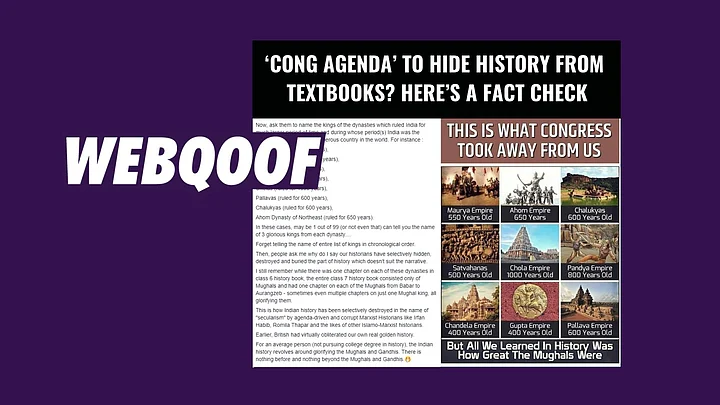CLAIM
A viral post alleging distortion of history in Indian school textbooks has been doing rounds on social media. The Congress party has been accused of changing the history taught in Indian schools to focus on the Mughal rulers. The message claims that, “historians have selectively hidden, destroyed and buried the part of history which doesn't suit the narrative.”
Stating that dynasties before the Mughal rule such as the Mauryas, Guptas and Cholas, haven’t been given enough importance in school syllabi, the message further says “This is how Indian history has been selectively destroyed in the name of ‘secularism’ by agenda-driven and corrupt Marxist Historians like Irfan Habib, Romila Thapar and the likes of other Islamo-Marxist historians.”
Twitter users also attacked Congress for “robbing” Indians of their true history.
On the other hand, several users denied these claims and tweeted in support of Congress stating that these topics had been included in their school syllabus.
TRUE OR FALSE?
The claims in the message are false as NCERT textbooks that are used in majority of schools affiliated to the Central Board of Secondary Education for class 6 to class 8 cover most of these dynasties. The course has been divided periodically, from Ancient, Medieval to Modern. Since, the Mughal empire falls in the medieval period, class 7 textbooks, carry a chapter on the Mughal rulers along with the other developments in that period.
WHAT WE FOUND OUT
The Quint spoke to a history teacher in a private school in Delhi, Chandraneev Das who confirms that the syllabus is “pretty well-structured” as it covers the Indian history right from pre-history, Stone Age to the later national movements during the Independence, while also introducing them to the history, culture and lifestyle of the various parts of India.
“You could question why we are doing the entire history on (East India) Company, if there’s a question on why are we doing Mughal history,” Das added.
Another senior history teacher, Piu Dutt also rubbished the claims.
“I have been teaching the syllabus for the last 29 years and I know it’s (these claims) not true. There’s a gradation,” Dutt said. She added that in class 6 the students are taught everything from Indus Valley to Harshvardhan’s rule, which is a “totally Hindu period.”
NCERT textbooks for class 6 cater to the ancient period, tracing the origins of Indian civilization from the Harrapans to later developments of empires like the Guptas or Pallavas.
Chapter 7 of the class 6 textbook, ‘History – Our Past I’ provides in-depth information on the Mauryan empire and its ruler, Ashoka. Subsequent chapters focus on not just the emperors but the way of life of commoners and workers as well.
Chapter 10 includes the kingdoms starting from the Gupta empire to the Pallavas and Chalukyas.
In the class 7 textbook, the Chapter 2 has a case study on the Chola dynasty. The textbook also has one chapter each on the Delhi Sultans and the Mughal empire, as they form a prominent period in the medieval Indian history. Chapter 7 of the textbook, is about the tribal and nomadic communities and contains information about the Ahom dynasty.
When broken down to number of pages, the Mauryan empire is covered in 15 pages, the Gupta empire in five, Pallavas and Chalukyas in five and the Cholas in six. The Mughal empire takes up 15 pages but covers the entire period of Mughal rule from Babur to Aurangzeb.
